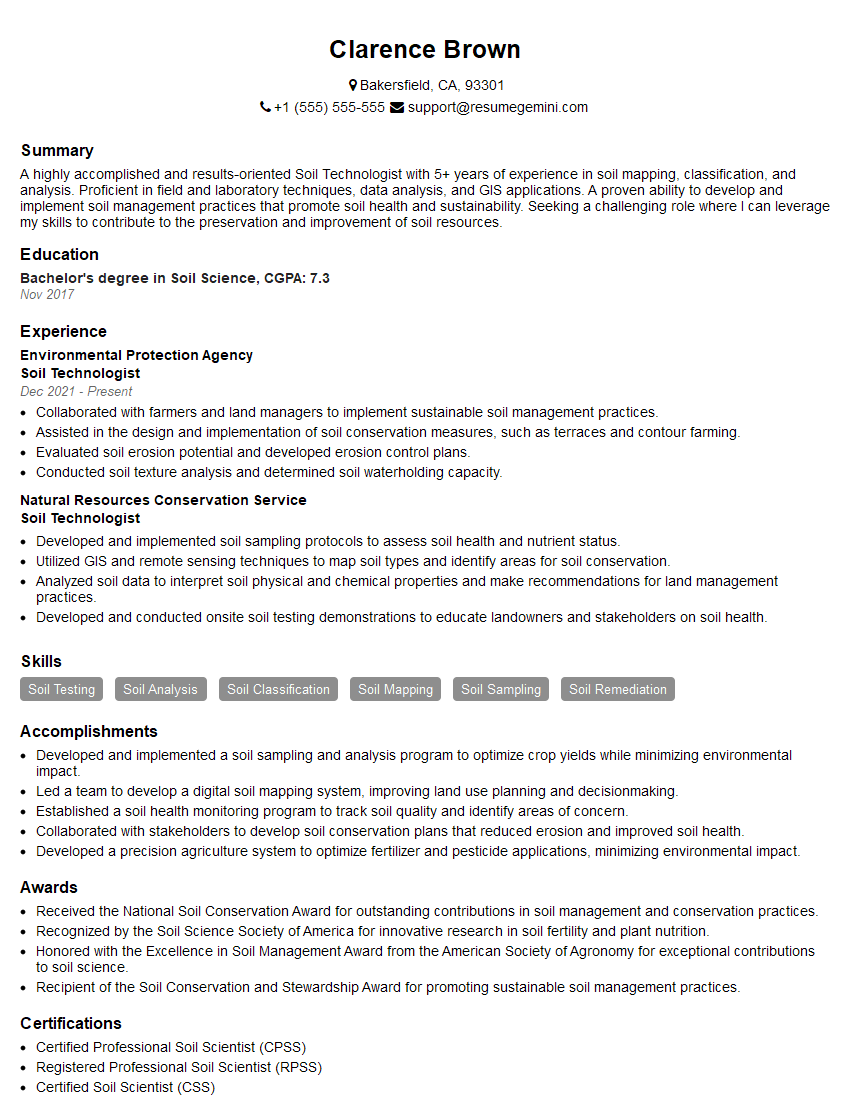Are you a seasoned Soil Technologist seeking a new career path? Discover our professionally built Soil Technologist Resume Template. This time-saving tool provides a solid foundation for your job search. Simply click “Edit Resume” to customize it with your unique experiences and achievements. Customize fonts and colors to match your personal style and increase your chances of landing your dream job. Explore more Resume Templates for additional options.

Clarence Brown
Soil Technologist
Summary
A highly accomplished and results-oriented Soil Technologist with 5+ years of experience in soil mapping, classification, and analysis. Proficient in field and laboratory techniques, data analysis, and GIS applications. A proven ability to develop and implement soil management practices that promote soil health and sustainability. Seeking a challenging role where I can leverage my skills to contribute to the preservation and improvement of soil resources.
Education
Bachelor’s degree in Soil Science
November 2017
Skills
- Soil Testing
- Soil Analysis
- Soil Classification
- Soil Mapping
- Soil Sampling
- Soil Remediation
Work Experience
Soil Technologist
- Collaborated with farmers and land managers to implement sustainable soil management practices.
- Assisted in the design and implementation of soil conservation measures, such as terraces and contour farming.
- Evaluated soil erosion potential and developed erosion control plans.
- Conducted soil texture analysis and determined soil waterholding capacity.
Soil Technologist
- Developed and implemented soil sampling protocols to assess soil health and nutrient status.
- Utilized GIS and remote sensing techniques to map soil types and identify areas for soil conservation.
- Analyzed soil data to interpret soil physical and chemical properties and make recommendations for land management practices.
- Developed and conducted onsite soil testing demonstrations to educate landowners and stakeholders on soil health.
Accomplishments
- Developed and implemented a soil sampling and analysis program to optimize crop yields while minimizing environmental impact.
- Led a team to develop a digital soil mapping system, improving land use planning and decisionmaking.
- Established a soil health monitoring program to track soil quality and identify areas of concern.
- Collaborated with stakeholders to develop soil conservation plans that reduced erosion and improved soil health.
- Developed a precision agriculture system to optimize fertilizer and pesticide applications, minimizing environmental impact.
Awards
- Received the National Soil Conservation Award for outstanding contributions in soil management and conservation practices.
- Recognized by the Soil Science Society of America for innovative research in soil fertility and plant nutrition.
- Honored with the Excellence in Soil Management Award from the American Society of Agronomy for exceptional contributions to soil science.
- Recipient of the Soil Conservation and Stewardship Award for promoting sustainable soil management practices.
Certificates
- Certified Professional Soil Scientist (CPSS)
- Registered Professional Soil Scientist (RPSS)
- Certified Soil Scientist (CSS)
- Certified Soil Erosion and Sediment Control Specialist (CPESC)
Career Expert Tips:
- Select the ideal resume template to showcase your professional experience effectively.
- Master the art of resume writing to highlight your unique qualifications and achievements.
- Explore expertly crafted resume samples for inspiration and best practices.
- Build your best resume for free this new year with ResumeGemini. Enjoy exclusive discounts on ATS optimized resume templates.
How To Write Resume For Soil Technologist
- Highlight your technical skills and experience in soil science, including soil testing, analysis, and classification.
- Showcase your ability to use GIS and remote sensing technologies for soil mapping and data analysis.
- Emphasize your experience in developing and implementing soil management practices that promote soil health and sustainability.
- Provide evidence of your communication and outreach skills, such as experience in conducting soil testing demonstrations and educating landowners.
Essential Experience Highlights for a Strong Soil Technologist Resume
- Developed and implemented soil sampling protocols to assess soil health and nutrient status.
- Utilized GIS and remote sensing techniques to map soil types and identify areas for soil conservation.
- Analyzed soil data to interpret soil physical and chemical properties and make recommendations for land management practices.
- Developed and conducted onsite soil testing demonstrations to educate landowners and stakeholders on soil health.
- Collaborated with farmers and land managers to implement sustainable soil management practices.
Frequently Asked Questions (FAQ’s) For Soil Technologist
What is the role of a Soil Technologist?
Soil Technologists play a crucial role in preserving and improving soil resources. They conduct soil surveys, collect and analyze soil samples, and develop soil management practices that promote soil health and sustainability. Their work helps farmers, land managers, and policymakers make informed decisions about soil use and conservation.
What are the qualifications for becoming a Soil Technologist?
Most Soil Technologists hold a bachelor’s or master’s degree in Soil Science or a related field. They also have a strong foundation in chemistry, biology, and environmental science. Additionally, they are proficient in field and laboratory techniques, data analysis, and GIS applications.
What are the job prospects for Soil Technologists?
The job outlook for Soil Technologists is expected to grow faster than average in the coming years. This is due to increasing demand for soil scientists to address issues such as soil degradation, climate change, and food security.
What are the key skills required for a Soil Technologist?
Key skills for Soil Technologists include soil sampling and analysis, soil classification and mapping, data analysis, GIS applications, and communication skills.
What is the salary range for Soil Technologists?
The salary range for Soil Technologists can vary depending on factors such as experience, education, and location. According to the U.S. Bureau of Labor Statistics, the median annual salary for Soil and Plant Scientists was $66,360 in May 2021.